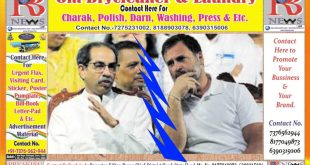In an interview to Organiser, RSS chief Mohan Bhagwat expressed his views on the security of the country and the role of Hindu society. He said that India should not depend on others for national security. He said that we should strengthen our internal strength against the coalition of hostile forces, so that the country can become invincible.
The RSS chief said that India needs to combine its power with righteousness and virtues. For this, only military or physical strength will not be enough. He said that it has to be used with moral purpose to counter the attack on the border.
Mohan Bhagwat said that true power is internal. We should not depend on others for national security. We should be able to protect ourselves. No one can defeat us, no matter how many powers come together. He said that there are evil forces in the world which are aggressive by nature. Therefore, a virtuous person is not safe only because of his virtues, he should combine virtues with power.
Evil forces on all borders
He said we should worship both virtue and power. To protect the gentlemen, to destroy the wicked, we must have power. The RSS chief said that when there is no option, evil has to be eliminated by force. We are not doing this to establish our supremacy, but to ensure that everyone can live a peaceful, healthy and empowered life. We have no choice but to be powerful, as we are seeing the wickedness of evil forces on all our borders.
India’s internal strength and unity
He said that anyone will worry about Hindus only when Hindus are strong enough. The safety of Hindus globally depends on India’s internal strength and unity. Bhagwat gave the example of Hindus in Bangladesh, where they showed the courage to fight back instead of running away. This reflects a significant change in mindset, which symbolizes increasing inner confidence and courage.
India gets global respect
According to Mohan Bhagwat, Hindu society and India’s pride are deeply connected. Only a strong and glorious form of Hindu society will give India global respect and strength. He called upon the society to unite and strengthen the country’s civilizational heritage.
Banned in 1948 and 1975, then how did RSS become such a powerful organization, Mohan Bhagwat told the reason
In an interview given to Organiser, Rashtriya Swayamsevak Sangh (RSS) chief Mohan Bhagwat expressed his views on the ban imposed on RSS in the years 1948 and 1975. Mohan Bhagwat said that the ban imposed on RSS in 1948 and 1975 was politically motivated. Those who imposed the ban also knew very well that the Sangh is not harmful but beneficial. But due to natural ideological competition in such a large society, the people sitting in the government chose to suppress the Sangh to maintain their political dominance.
During the first ban everything was the opposite, the end of the Sangh was certain. Despite all the adversities, RSS came out clean and within 15-20 years not only regained its ground but also became even stronger.
Role of volunteers in social change
The RSS chief said that the volunteers working in the branches at that time did not have any major social role, but they started participating in various activities and ensuring their decisive role. In a way, the 1948 ban helped the Sangh to realize its potential and the volunteers started planning to play a leading role in social change.
It was clear from the beginning that the work of the Sangh is not limited to one hour of branch, but its sanskar, the values imbibed in the branch, should be visible in personal, family, social and professional life in the remaining 23 hours.
Society experienced the power of the Sangh
Later, during the Emergency of 1975, the society could experience the power of the Sangh. When many big leaders were stunned in fear and despair, an ordinary volunteer was full of confidence that he would get through the difficult times and emerge from the crisis without a scratch. During the Emergency of 1975, the RSS gave priority to restoring democracy than fighting against the ban imposed on itself.
He said that we also stood with those who generally used pessimistic language against the Sangh. During this period, the Sangh emerged as an intellectual, trustworthy pole of the society. After the Emergency, the Sangh emerged with many times more strength.
RSS’s 100-year journey
On the question of how do you see this 100-year journey of the Sangh as a volunteer and Sarsanghchalak, Mohan Bhagwat said that Dr. Hedgewar started this mission very thoughtfully. The challenges before the nation were analyzed and the necessary solution was decided through experience, experiment, which proved to be appropriate.
Society’s trust was gained
By 1950, trust had been created about the working method of the Sangh and the Sangh work could move forward overcoming all obstacles. In the next phase, the Sangh’s nationwide expansion and the place of volunteers in the society started getting created. In four decades, the volunteers of the Sangh earned the trust of the society through their character, actions and sense of belonging in various fields of national life.
After the 1990s, it was proved that the country can be governed on the basis of this ideology and virtues. Now the next step is to ensure that the entire society, following this thought process and virtues, works honestly and selflessly, sets aside all differences and starts working to take the country to the pinnacle of glory.
Milestones in the 100-year journey
Mohan Bhagwat said that initially the Sangh had nothing. Its ideology was not recognized, means of propaganda were not available. There was nothing in the society except neglect and opposition, not even workers. If someone had put this data in a computer, it would have predicted its premature death. But the Sangh survived and after facing the challenges of saving the Hindus, it successfully emerged as a force.
Organized Hindu society
After the partition of the country and the ban on the RSS, by 1950 it was certain that the work of the Sangh would continue and Hindu society could be organized through this method. Later, the work of the Sangh expanded even more than before.
Due to the constructive role of the Sangh in the restoration of democracy during the Emergency of 1975, the society realized the importance of the power of the Sangh. Later, through participatory movements like Ekatma Rath Yatra, Kashmir related awareness, Shri Ram Janmabhoomi Mukti Andolan and Vivekananda Sardhashati (150th anniversary) and the widespread expansion of service work, the sense of credibility of the ideology of the Sangh and its integrity increased rapidly in the entire society.
 RB News World Latest News
RB News World Latest News






